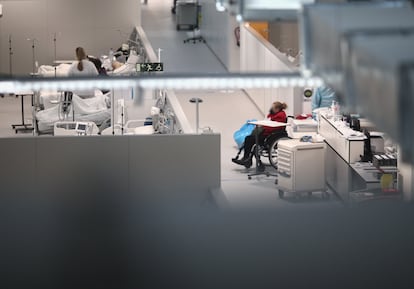Spain reports 38,869 new coronavirus cases in a day, a new record high
The 14-day cumulative number of infections per 100,000 inhabitants is now above the extreme risk level of 500 in nine of the country’s regions

The number of new coronavirus infections reported on Wednesday by the central Health Ministry, 38,869 in 24 hours, is by far the worst seen so far in the pandemic. The previous record was 25,595, on October 30. The figure was 53% up on the previous day, and is triple the highest figure seen during the first wave last year – although it should be noted that tests were only being carried out on the most serious cases at that time, and around two-thirds of infections are thought to have gone undiagnosed at that time.
But even bearing this in mind, the nearly 39,000 cases reported yesterday would still be at the maximum levels seen, and the real figure is likely even higher taking into account the fact that even now not all infections are detected by tests and that many asymptomatic cases do not seek medical treatment at all. In total, according to the ministry report, there have been 2,176,089 confirmed positive cases in Spain since the health crisis began.

Health Minister Salvador Illa spoke on Wednesday before the latest data was released but after a meeting of the Interterritorial Committee, which brings together his ministry and the health chiefs from Spain’s regions, which are in charge of handling the pandemic. He warned of a “significant rise” in cases, and pointed to the 14-day cumulative number of coronavirus cases per 100,000 inhabitants, a key data point used to monitor the progress of the virus. In 24 hours, this number has gone from 454.22 to 492.88, a rise of 8%. In a week the increase has been 66%, and since December 23 it has gone up by 94%. The following regions are now above 500, a level considered to be of extreme risk, according to the territorial policy minister, Carolina Darias: Balearic Islands (613), Castilla-La Mancha (636), Castilla y León (539), Catalonia (527), Valencia (609), Extremadura (1,131), Madrid (628), Murcia (713) and La Rioja (650).
The major difference right now is the mortality of the disease. For now, this record high in cases is not being accompanied by a record number of Covid-related deaths, although these are increasing. There have been 1,439 victims reported over the last seven days, the same figure seen on December 13, when the 14-day cumulative number of coronavirus cases per 100,000 inhabitants was around 200, a level that was close to the minimum of the second wave (189). Wednesday’s report put the confirmed death toll in Spain from the coronavirus at 52,878, adding 195 to the total from the day before.
Where the impact is being seen, however, is with hospitalizations. Right now 14.64% of hospital beds are occupied by coronavirus patients, who number 18,215 in total. A month ago this percentage was 9.22%, accounting for 11,648 patients. The occupation of intensive care unit (ICU) beds is also rising. Currently Covid patients are occupying 24.67% of ICU beds (2,744 people in total) compared to 9.22% on December 11.
We warned everyone about this, but all anyone was thinking about was saving Christmas and now it has been proven that the family and social meetings have been devastatingGuadalupe Fontán, medical administration nurse
“The current data is very bad and it is possible that it will get worse in the next weeks given that the effects of Christmas and New Year are yet to be seen,” said Valencia Patricia Guillem, an epidemiologist from the Universidad Europea. “I think that bringing down the figures should be a priority, and for that the only method is a stricter confinement, because while partial measures are being taken, there is still a lot of movement of the population. These measures should be taken in a single direction, because if not we have 17 different ways of understanding the restrictions,” she said, in reference to the different approaches being taken by Spain’s regions.
“Look, we warned everyone about this, but all anyone was thinking about was saving Christmas and now it has been proven that the family and social meetings have been devastating,” said Guadalupe Fontán, a nurse specializing in medical administration.
Given the situation, Illa said on Wednesday that he was hoping that the stricter measures that are being implemented by the regions could flatten the curve, although, he added, there are “very tough weeks ahead.”
English version by Simon Hunter.
Tu suscripción se está usando en otro dispositivo
¿Quieres añadir otro usuario a tu suscripción?
Si continúas leyendo en este dispositivo, no se podrá leer en el otro.
FlechaTu suscripción se está usando en otro dispositivo y solo puedes acceder a EL PAÍS desde un dispositivo a la vez.
Si quieres compartir tu cuenta, cambia tu suscripción a la modalidad Premium, así podrás añadir otro usuario. Cada uno accederá con su propia cuenta de email, lo que os permitirá personalizar vuestra experiencia en EL PAÍS.
¿Tienes una suscripción de empresa? Accede aquí para contratar más cuentas.
En el caso de no saber quién está usando tu cuenta, te recomendamos cambiar tu contraseña aquí.
Si decides continuar compartiendo tu cuenta, este mensaje se mostrará en tu dispositivo y en el de la otra persona que está usando tu cuenta de forma indefinida, afectando a tu experiencia de lectura. Puedes consultar aquí los términos y condiciones de la suscripción digital.








































